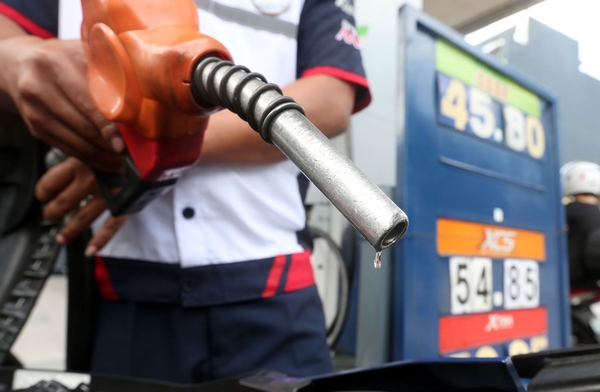With petroleum pump prices falling for the eighth week in a row, gasoline is now cheaper by 45 centavos a liter compared to the last week of 2017, or before the first-tranche increase in excise implemented under the Tax Reform for Acceleration and Inclusion (TRAIN) Act.
The TRAIN law added P2.97 in taxes (P2.65 in excise plus 32 centavos in value-added tax a liter) to gasoline prices since Jan. 1. Also, the law imposed taxes totaling P2.80 for every liter of diesel (an excise of P2.50 plus 30 centavos VAT).
Discounting the P2.97 levy, gasoline prices have gone up by 29 times and down by 18 times for a net decrease of 45 centavos a liter. With the TRAIN law, gasoline is still priced higher by P2.52 a liter compared to end-December prices.
Also, diesel prices have so far this year gone up by 28 times and down by 19 times for a net increase of P1.60 a liter. With the taxes, diesel is still costlier by P4.40 a liter compared to pre-TRAIN prices.
The latest round of price cuts brought down the price of diesel by P2.10 a liter and of gasoline by P2 a liter.
Based on monitoring by the Department of Energy, the latest movements brought prices of diesel to within the range of P36.55 to P41.09 a liter.
Prices of gasoline with an octane rating of 95 are now in the range of P41.80 to P52.42 a liter.
The current price crash has shaved off a total of P10.55 from diesel prices and P11.85 on gasoline prices.
Before the downtrend, which saw crude oil going on the longest losing streak in at least 30 years, price of crude hit a four-year high.
As of Nov. 29 trading, Dubai crude—the bellwether for Asian imports—was fetching $65.59 a barrel, down 28 percent from $84.12 on Oct. 3.
With the sudden change in direction, economic managers have also withdrawn their recommendation about the suspension of implementing the second tranche of fuel taxes that was supposed to take effect on Jan. 1, 2019.
For the second tranche, the TRAIN law imposes an additional P2.24 a liter for both diesel and gasoline—P2 excise plus 24 centavos VAT.
According to University of the Philippines School of Statistics professor Dennis Mapa, a P3-a-liter tax on diesel causes inflation rates for the poor—especially the bottom 30 percent of Filipino households—to increase by 0.9 percentage point.
Thus, second-tranche tax hike on diesel would raise inflation for the poor by 0.045 percentage point.
In a lecture contributed to BSP-UP Professorial Chair Lecture Series just before the TRAIN law’s implementation, Mapa said the effect on poor households was 10 times worse than the additional 0.09 percentage point that “nonpoor” households feel.
By the third year of the TRAIN law—2020—the excise would (all three tranches combined) have risen to P6 a liter, or P6.72 a liter including the VAT.
Mapa said that at P6 a liter, the tax on diesel would add 1.8 percentage points to inflation felt by the poor. This was also 10 times worse than the 0.18 percentage point added to the burden of nonpoor households.
He said that when the fuel taxes were fully implemented in 2020, there would be an additional 205,000 poor households in the country, which “translate to more than a million individuals.”
“The Philippine Statistics Authority must update and regularly report the inflation rate of the poorest 30 percent of households to provide the appropriate information to the policymakers,” Mapa said.
